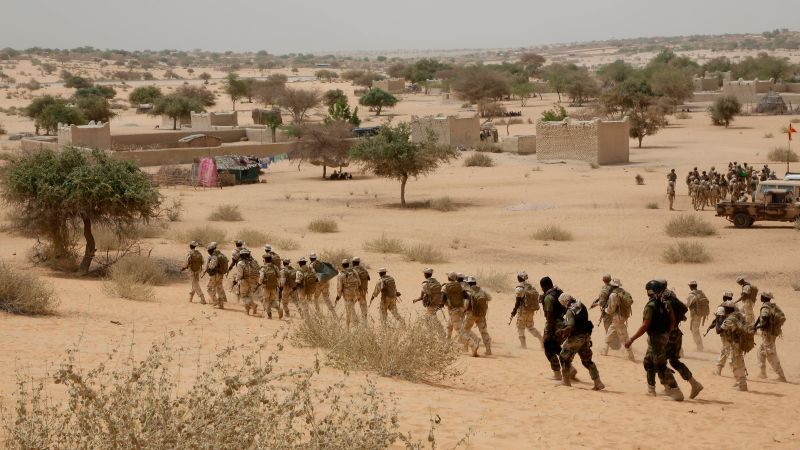Jerome Delay/AP/File
In this March 2015 photo, Chadian military and Nigerian special forces participate in Exercise Flintlock with U.S. forces and Western partners in Mao, Chad.
CNN
—
The move comes as the United States is at risk of losing its military presence in another African country after the Chadian government sent a letter threatening to scrap a key security agreement, four U.S. sources said. There is a risk of further ceding US influence in the region to Russia.
In a letter sent to the U.S. defense attaché last week, Chadian authorities threatened to scrap the Status of Forces Agreement (SOFA), which sets out the rules and conditions under which U.S. military personnel can operate in the country. The letter did not directly order U.S. troops to leave Chad, but officials told CNN it said American forces needed to leave the French base in N'Djamena.
The letter specifically mentioned the US Special Operations Forces (SOTF) at the base, which is a key location for US special operations forces in the region, two of the people said. However, this unit is not the only U.S. military unit on the base, as all U.S. military personnel stationed in Chad are based in N'Djamena.
One of the officials said the letter was not sent through official diplomatic channels, which is standard practice in dealing with such matters. Two officials warned that the letter could be a negotiating tactic by the Chadian government to obtain a new agreement favorable to its interests.
The exact number of U.S. troops in the country is unclear, but one U.S. official said there are fewer than 100 troops in the country.
CNN has reached out to the Chadian government for comment.
The move comes just a month after neighboring Niger's military government ended an agreement with the U.S. military that allowed American soldiers to operate in the country.
One of the sources told CNN that Chad's leadership is looking to follow Niger's example and use the opportunity to extract further concessions from the United States. But the official said Chad's threat to break the status of forces agreement blindsided U.S. officials.
The move comes at a critical time for U.S. interests in Africa, as U.S. officials have warned of growing Russian influence across the continent.
Marine Corps Gen. Michael Langley, commander of U.S. Africa Command, told the Senate Armed Services Committee in March that Russia is “moving toward occupying Central Africa and the Sahel” at an “accelerated pace.”
“(A) number of countries are actually at the tipping point of being captured by the Russian Federation because they are spreading some of the false narratives out of strategic answers, access and influence throughout Libya and throughout the Maghreb.” said Langley. “That's NATO's southern flank. We need to be able to maintain access and influence across the Mahghhreb, from Morocco to Libya.”
Langley said in a separate House Armed Services Committee hearing last month that Central African countries are in a “dilemma” and need development aid from countries such as Russia and China, but that those needs and “national sovereignty” are “risks to the future” must be balanced, he said.
“The risk is high in this area,” Langley said.
Langley visited Chad in January with AFRICOM's senior noncommissioned officer advisor, Staff Sergeant Langley. Major Michael Woods. During his visit, Langley met with Chadian military leaders, including Chadian military chief of staff Gen. Abakar Abdelkerim Daoud, according to an AFRICOM press release at the time.
Langley said in the release that AFRICOM “remains committed to building lasting partnerships with Chad and other African countries.”


